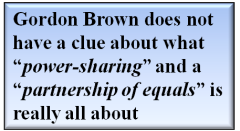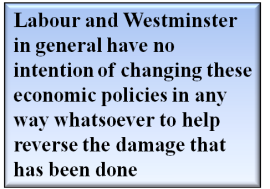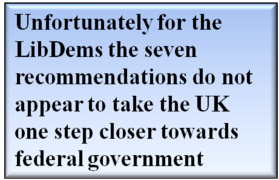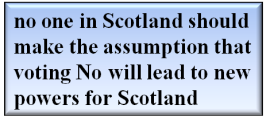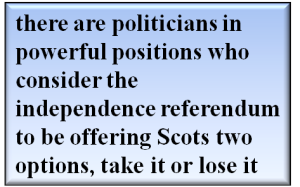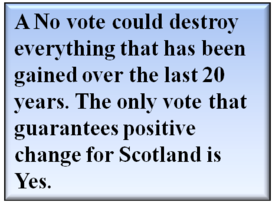For a few weeks now the unionist parties have been starting to unveil their alternatives to independence in the event of a No vote. These alternatives have been dressed up as being a substantial increase in the power the Scottish Parliament has today. However, beware, all is not quite what is seems! There is a distinct possibility that a No vote will result in the Scottish Parliament being stripped of powers rather than gaining any.
So what are the proposals that have been produced by the supporters of a Union?
We have had Gordon Brown delivering his six “major” constitutional changes aimed at delivering a “radical transfer of power to Scotland”. He talked about a “power-sharing” UK and a “partnership of equals”. Sadly when you start to examine the details of the Labour Party proposals it becomes clear that Gordon does not have a clue about what “power-sharing” and a “partnership of equals” is really all about. The starting point for any power sharing or equal partnership has to start with the union treaty of 1707 being torn up and a new relationship being established between Scotland and the rest of the UK. Quite simply the current union treaty does not provide the framework that can be used to establish a new relationship; it is not fit for purpose.
And what about the six “major” constitutional changes Labour proposes.
A new constitutional law that sets out the purpose of the UK, a constitutional guarantee on the permanence of the Scottish Parliament, a vague idea about a new division of powers between Scotland and Westminster, a tax sharing agreement to “pool and share” UK resources, power-sharing partnerships to address shared problems such as unemployment, and a “radical” transfer of power from the national parliaments to local communities.
Apart from the vague idea about a new division of powers and some tinkering with the tax system where is the “radical transfer of power to Scotland” in these proposals? The answer is nowhere! There is nothing in the Labour proposal that constitutes a radical transfer of power. The proposals produced by the Scottish Labour Devolution Commission suggest that additional powers related to the provision of benefits, health and safety, employment tribunals, equality, and consumer rights should be devolved to the Scottish Parliament. However, this list is miniscule compared to the list of powers that the Labour Party believes should be retained by Westminster. National insurance, corporation tax, VAT, alcohol, tobacco and fuel duties, and the tax on oil receipts are among the long list of tax related powers that Labour believes for “a variety of good reasons” should not be devolved to the Scottish Parliament. Likewise, Labour is opposed to the devolution of most key benefits such as jobseekers allowance, maternity allowance, and income support.
Overall the proposal put forward by Labour will deprive Scotland of all the fundamental levers of economic control that are essential for Scotland to develop and manage its own economy in the most effective manner. As far as Labour is concerned Scotland will have to continue to suffer from the inappropriate economic policies that are devised for the benefit of London and the South East. These inappropriate economic policies may not be designed to damage Scotland, the impact on Scotland is just collateral damage, it’s just bad luck for Scotland that the economic polices that are good for southern England are disastrous for Scotland. What is most troubling for Scotland is that Labour and Westminster in general have no intention of changing these economic policies in any way whatsoever to help reverse the damage that has been done, and will continue to be done, to Scotland. For this one reason alone independence is imperative for Scotland.
So much for Labours feeble alternative proposals to independence but what do the LibDems have to offer?
The Campbell II report contains the LibDem proposals for change after a No vote. The seven recommendations in the report are all wrapped up in the notion of Federalism, the LibDems argue that the long term future for the UK is a Federation. Within this federation a range of powers would be transferred to the Scottish Parliament including control over rates and bands of income tax, capital gains tax, inheritance tax and control over the proceeds from corporation tax. Interestingly the proposal does not appear to suggest that the Scottish Parliament would have full control over corporation tax such as setting rates and bands. Excluded from the powers that would be transferred to the Scottish Parliament are all of those related to social welfare and employment.
Unfortunately for the LibDems the seven recommendations do not appear to take the UK one step closer towards federal government or for any real transfer of powers to Scotland. The recommendations are for provisions in the Queens Speech to strengthen yet to be determined powers for Scotland, an analysis of the options available for enhanced Scottish powers, sharing of civil servant knowledge on the referendum, ensuring that the fiscal body created to support the Scotland Act 2012 can support further financial powers, convene a meeting to obtain consensus on further powers for Scotland, political parties should include commitments in their manifestos for the agreed Scottish reforms, and finally another Scotland Act to implement the yet to be decided tax powers and a resolution in both parliaments on the permanence of the Scottish Parliament.
If the Labour proposals were feeble then these proposals from the LibDems are nothing less than woeful. Not one of the recommendations identities any tangible form of power transfer. It is all waffle, hot air and inaction!
So have the Tories anything better to offer? It does not appear so. Ruth Davidson has spoken in praise about the Federal system of government in the United States and suggested that once the independence referendum has taken place “we can take a serious and considered look at a new spread of responsibilities within the UK”. However, there is not much chance of ideas like that ever coming to fruition from the Scottish Tories considering how tightly Ruth has her strings pulled by Cameron in London. Even if the Scottish Tories do have any alternative proposals they have decided not to reveal any details until May of this year. Some Tories have even been arguing that they should not discuss any form of enhanced devolution until after the referendum. Lord Lang of Monkton, ex Tory Secretary of State for Scotland, is of the opinion that “talks over further devolution should wait until after the referendum and even then only take place on a UK-wide basis”. Scotland will just have to wait and see what the Tories have to offer, I’m sure we are all waiting with bated breath!
So now we have it, the (almost) full range of alternatives from the supporters of the Union. They are not very impressive and the most recent opinion polls suggest that Scots are not being fooled by these pitiful ideas on “increased powers for Scotland”.
However, there is one very troubling aspect to the situation that is developing. Many Scots believe that a No vote will result in a package of additional powers being passed to the Scottish Parliament. Well hasn’t David Cameron told us all that this is what will happen if the result of the referendum is No? Well it’s not quite as simple as that. Nothing has been guaranteed, nothing has been approved by Westminster, and it could all be hollow talk. Worse still, there could well be a number of significant hurdles to be overcome before any new powers would be transferred to the Scottish Parliament.
It was just over a year ago that a powerful Westminster committee concluded that any further changes to the devolution settlement would require a UK wide referendum. The committee concluded "We believe that the future of the Union is the property of all those who live in the UK. Securing the involvement and consent of us all will mean that the continual evolution of our Union will be supported and sustainable”. On this basis it is impossible for David Cameron, or any Westminster political party, to make promises on the additional powers that will be devolved to the Scottish Parliament. Any powers that Westminster may propose to devolve could be rejected by the voters of the rest of the United Kingdom. So no one in Scotland should make the assumption that voting No will lead to new powers for Scotland.
This situation might be disappointing for Scots who want to see more powers being transferred to Scotland but who are uncomfortable about voting for full independence. Unfortunately for them it gets worse. There are powerful groups of unionist politicians who wish to use a No vote as a reason to reduce the powers of the Scottish Parliament rather than increase them. It is clear that there are politicians in powerful positions who consider the independence referendum to be offering Scots two options, take it or lose it. For these people, if Scotland does not take control of its own affairs by voting Yes then they will interpret a No vote as meaning Scots have given up on all notions of nationhood and that a more entrenched Union is what they desire. These extreme unionist politicians will be only too happy to deliver this assumed desire whether it is true or not.
This situation was highlighted by Andrew Neil during a Scotland Tonight interview last year. He stated, “Devolution, the Calman Commission, the Scotland Bill, the Edinburgh Agreement, all this and more you have because Westminster parties are scared of the SNP. If you vote No you massively change the balance of power and they will not only give you nothing, but will probably take powers away from the Scottish Parliament”.
One of the chief protagonists supporting this view of the referendum outcome is Ian Davidson, Chairman of the Scottish Affairs Select Committee. Davidson is reputed to have stated whilst discussing the powers of the Scottish Parliament, “Once we get our No vote in 2014, we’ll rip so many powers from those neo-Nats that they might as well meet once a month above a pub, for all they’ll have left to talk about” In a similar vein, Tom Harris, when campaigning for the Scottish Labour leadership proposed that if he were to become leader he would wish to instigate policies that would repatriate some powers back from Holyrood to Westminster.
The messages are quite clear, a No vote will not guarantee any additional powers being transferred to the Scottish Parliament, in fact, if the more extreme unionists have their way powers will be relinquished by the Scottish Parliament. The conclusions are equally clear, for all Scots who wish to see Scotland take control of its own affairs, its development, and its prosperity the only vote that will guarantee this is a Yes vote. So if you are thinking about voting No in September in the hope that it will result in enhanced powers for the Scottish Parliament then think again. A No vote could destroy everything that has been gained over the last 20 years. The only vote that guarantees positive change for Scotland is Yes.
The creator of this blog and the A Union of Equals website has no political affiliations.


